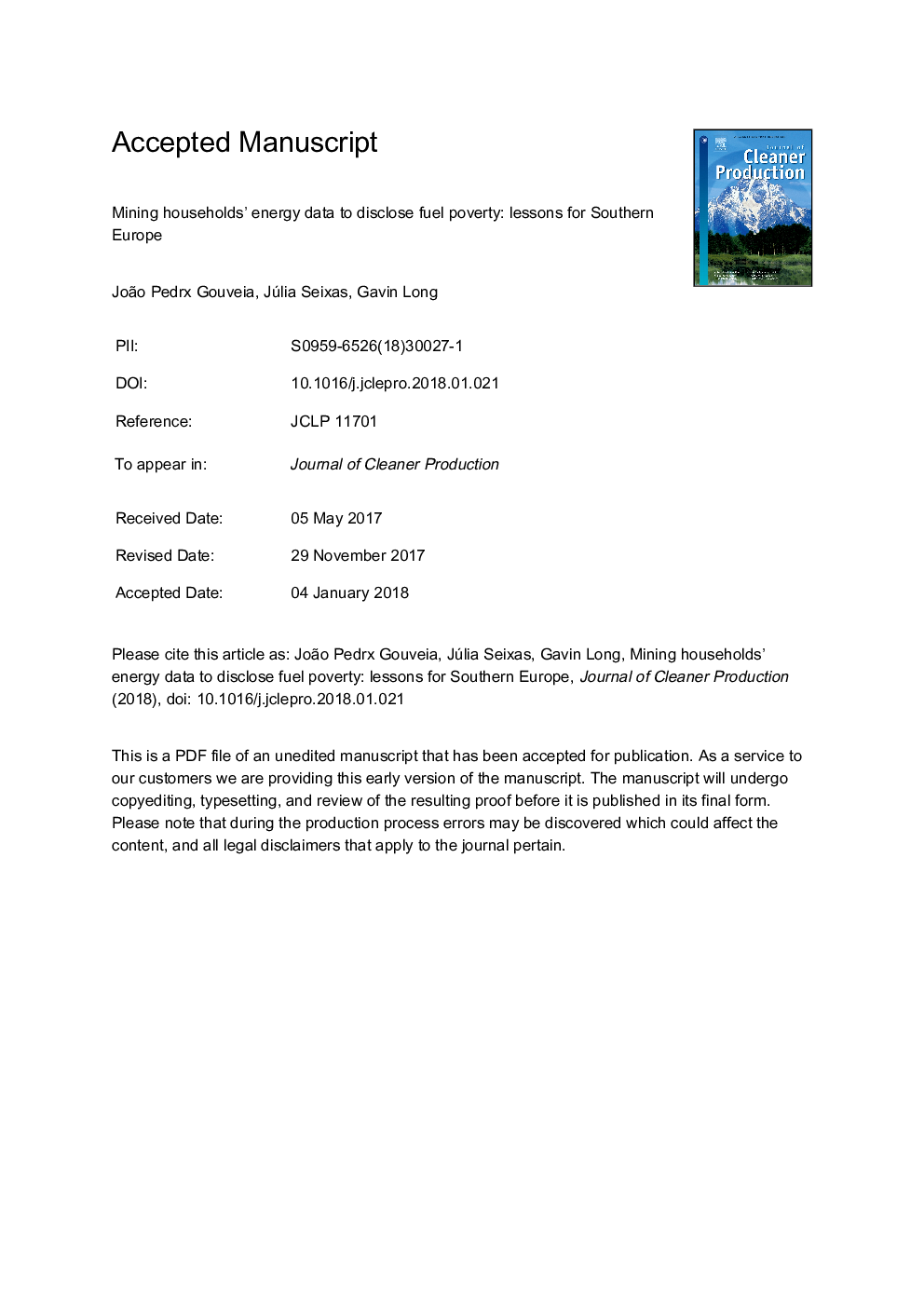| کد مقاله | کد نشریه | سال انتشار | مقاله انگلیسی | نسخه تمام متن |
|---|---|---|---|---|
| 8098460 | 1522075 | 2018 | 37 صفحه PDF | دانلود رایگان |
عنوان انگلیسی مقاله ISI
Mining households' energy data to disclose fuel poverty: Lessons for Southern Europe
ترجمه فارسی عنوان
داده های انرژی معادن خانوار برای افشای فقر سوخت: درس های جنوب اروپا
دانلود مقاله + سفارش ترجمه
دانلود مقاله ISI انگلیسی
رایگان برای ایرانیان
کلمات کلیدی
فقر سوخت، چاقی سوخت، متر هوشمند، نظرسنجی، شبیهسازی انرژی ساختمانها، راحتی حرارتی،
ترجمه چکیده
فقر سوخت یک مشکل شناخته شده و رو به افزایش در چندین کشور اروپایی است. در حال حاضر، بخش عمده ای از ادبیات این موضوع را پوشش می دهد، اما تجزیه و تحلیل اختصاصی برای پرتغال، علیرغم برداشت بالا از این وضعیت، کمیاب است. این مقاله کمک می کند تا این شکاف دانش را با تمرکز بر یک شهرستان جنوبی اروپا پر کند، در حالی که مجموعه داده های جدید و تجزیه و تحلیل را به ارزیابی این موضوع؛ شناسایی گروه های مصرف کننده و بحث سیاسی. ثبت روزانه برق هوشمند روزانه با داده های اجتماعی و اقتصادی جمع آوری شده از نظرسنجی درب به درب، برای درک میزان و تعیین کننده های مصرف انرژی برای دو گروه متداول مصرف کننده (در اینجا به نام فقر سوخت و گروه های چاقی سوخت). تجزیه و تحلیل بر اساس مقدار و مشخصات سالانه مصرف برق است و با شبیه سازی انرژی ساختمان برای نوع شناسی ساختمان های مرتبط در این گروه ها، برای شناسایی شکاف های حرارتی حرارت و خنک سازی، تکمیل شده است. وجود این شکاف ها امکان تأیید و / یا رد فرضیه اولیه فقر و شرایط چاقی را فراهم می کند. نتایج، متغیرهای اجتماعی-اقتصادی را به عنوان درآمد و رفتار مصرف کنندگان به عنوان عوامل تعیین کننده مصرف برق تشبیه می کنند. این کمبود شدید در سطح خانوارهای هر دو گروه، در خنک شدن (98٪ برای فقر سوخت و 87٪ برای چاقی) و فصلهای گرم (98٪ برای فقر سوخت و 94٪ برای چاقی سوخت) مشخص شد. نتیجه اصلی این است که مصرف الکتریسیته فقط برای جدا شدن گروه های مصرف کننده نمی تواند باشد. این ارزیابی می تواند برای حمایت از اقدامات سیاست انرژی و ابزارهایی که برای گروه های مختلف مصرف کننده هدف قرار می گیرد. به عنوان مثال، کمپین های مجزا و انگیزه های متمایز ممکن است برای دستیابی به کارایی و کاهش انرژی در حالی که سطح راحتی در محیط را حفظ یا بهبود می دهد، اعمال شود.
موضوعات مرتبط
مهندسی و علوم پایه
مهندسی انرژی
انرژی های تجدید پذیر، توسعه پایدار و محیط زیست
چکیده انگلیسی
Fuel poverty is a recognized and increasing problem in several European countries. A growing body of literature covers this topic, but dedicated analysis for Portugal are scarce despite the high perception of this condition. This paper contributes to fill this knowledge gap focusing on a European southern city while bringing new datasets and analysis to the assessment of this topic; consumer groups identification and to policy discussion. Daily electricity smart meters' registries were combined with socio-economic data, collected from door-to-door surveys, to understand the extent and the determinants of energy consumption for two contrasting consumer groups (herein called fuel poverty and fuel obesity groups). The analysis is based on the amount and annual profile of electricity consumption and was complemented with building energy simulations for relevant building typologies in those groups, to identify heating and cooling thermal performance gaps. The existence of these gaps allowed confirming and/or discarding the initial hypothesis of the poverty or obesity conditions. Results disclose socio-economic variables, as income, and consumers' behavior as key determinants of electricity consumption. It was identified a severe lack of thermal comfort levels inside households of both groups, either in cooling (98% for fuel poverty and 87% for fuel obesity) and heating seasons (98% for fuel poverty and 94% for fuel obesity). Major conclusion refers that electricity consumption cannot be used alone to segment consumer groups. This assessment may serve to support energy policy measures and instruments targeted to different consumers' groups. For example, distinct campaigns and differentiated incentives may apply to achieve energy efficiency and reduction while keep or improve indoor comfort levels.
ناشر
Database: Elsevier - ScienceDirect (ساینس دایرکت)
Journal: Journal of Cleaner Production - Volume 178, 20 March 2018, Pages 534-550
Journal: Journal of Cleaner Production - Volume 178, 20 March 2018, Pages 534-550
نویسندگان
João Pedro Gouveia, Júlia Seixas, Gavin Long,
